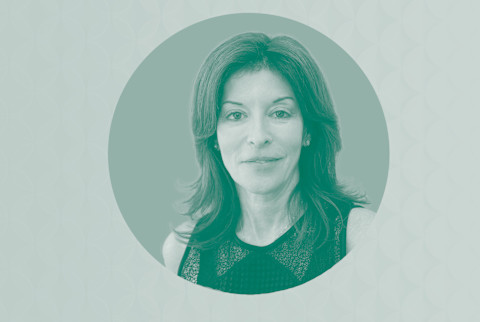I Prescribe Medical Marijuana: 4 Things To Know About How It Affects The Brain

As more and more states are voting in favor of recreational and/or medical marijuana, it makes sense people would grow curious about the drug's potential health benefits. But there are some conflicting viewpoints out there: Some tout THC's pain-relieving qualities1 and ability to help with seizure disorders, PTSD, and other neurological conditions, while others warn it has been associated with increased psychosis.
To wade through this giant debate, we asked Rebecca Siegel, M.D., a psychiatrist and licensed prescriber of medical marijuana in New York state: How, exactly, does marijuana affect the brain?
We should note, we're talking about chronic use here, which is admittedly hard to identify. "The research really hasn't been done in a systematic way," Siegel says on this episode of the mindbodygreen podcast (i.e., each team of researchers can define what they mean by "chronic use"). But from the available data we have, here's how Siegel navigates all the information:
Decision-making, coordination & impulse control.
When discussing how marijuana affects the brain, it's important to categorize said effects into the short and long term. So first, let's spend some time on the short term: "It can absolutely impact your frontal lobes," Siegel says. "The decision-making parts of the brain, the impulse control, the executive functioning parts of the brain... The cerebellum, which can affect coordination." (That's why you should not drive under the influence of any substance, marijuana included.)
Over time, Siegel notes, SPECT brain scans (aka, the brain-imaging technology used at Amen Clinics to help identify patterns associated with mental health conditions) show decreased blood flow to those frontal lobes—which may lead to changes in decision-making, impulse-control, executive functioning, etc. "Also, the learning and memory areas of the brain—the temporal lobe—can be severely impacted as well," she says. "And then the back of the brain where the cerebellum is, which is coordination and movement, also may be very impacted with years and years of chronic cannabis use."
Again, "chronic" is difficult to measure, as there hasn't been much clinical data to define the term—but Siegel associates these brain changes with what she considers long-term use.
Potential for psychosis.
In Siegel's book The Brain on Cannabis: What You Should Know About Recreational and Medical Marijuana, she references a rather fascinating 2019 study from King's College2: Those who smoked marijuana daily were three times more likely to be diagnosed with psychosis, and those who used high-potency marijuana daily increased their odds of developing psychosis by nearly five times. The study classified high-potency as 10% or higher—in today's market, marijuana typically has an 18 to 30% potency, and the most popular varieties in Colorado dispensaries are 17 to 28%3.
Seems like a concerning correlation, right? But Siegel urges us to regard it as just that—a correlation. A causal relationship would mean: Marijuana causes psychosis. Rather, "a correlation is, why are kids smoking?" Siegel poses. "Are they smoking because their peers are smoking? Are they smoking because they're self-medicating their psychosis beginnings? I'm not sure."
Essentially, she encourages us to think about it like a scientist: Because we don't have the necessary research to really dive into these issues, we can't make the call that marijuana influences the risk of psychosis—even though the limited data we do have is concerning.
Effects on anxiety.
On the flip side, Siegel has had patients who find marijuana actually helps with their anxiety. "I've even heard that it may help focus and concentration, which is mind-boggling to me," she explains. "It's very complicated, and I walk a very fine line."
That said, she acknowledges that it can be helpful for some people—she is a licensed prescriber, after all—but she only recommends medical use, not recreational use. "When you go to a dispensary, you hope you get what they say you're getting," she explains. "You can choose different ratios of THC (the psychoactive component) versus CBD (the non-psychoactive component). That type of balance can be much more helpful for some people rather than very high ratios of THC to CBD. I definitely do not recommend that for anyone."
A quick note on CBD naturally found in the medical marijuana plant: "CBD has an incredible impact on the brain and the body," adds Siegel. "We need to really research its anti-inflammatory, pain-relieving properties... There are so many things that it might do, but we don't have the research."
Dependence.
A common notion with marijuana is that you can't become "addicted" or "dependent" on the drug. As for Siegel? Well, she's not so sure: "I've heard older people and younger people say to me, 'I definitely feel withdrawal symptoms when I don't smoke, and I've been doing it a lot. I feel depressed, anxious, irritable when I stop,'" she says. "That seems quite real to me, from a clinical perspective, that you can develop a dependence on the substance."
The takeaway.
We're not going to sway you one way or another—as you can see, marijuana can affect people quite differently, and we need way more research to make any sort of judgment call. However, if you do use it, we suggest you consult a professional, like Siegel, for medical use only. We can speculate, but we don't really know how, exactly, it affects the brain—so she suggests proceeding with caution.
"Your brain is developing until your mid-20s," she says. "You really want to keep your brain [sharp] when you're 20, 40, 60, 80, maybe even 100. You don't want to be self-medicating. Are there potential uses for cannabis? Maybe. As a physician, more research needs to be done so that I can safely offer it to my patients."
